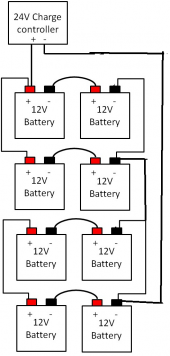wired1
New Member
Hi All,
I have a beach cottage in the Bahamas that is tied to the grid and we have rolling blackouts, as well as unannounced outages weekly. Last time we had one I plugged in a 100 watt inverter to my car and had fans and lights for the 4 hours it was out. My battery started my car the next morning, so now I want to expand on this.!!!
I already in my excitement purchased a 1000 watt Renogy inverter to get me started. Now I'm not sure where to take this. I'm not there for months at a time, and I think for now Solar panels are out because of the hurricane situation there and lack of space to put them safely.
I want to buy the right batteries to power my fridge and a few fans a TV and lights for 8 hours until the power comes back, or I could run my generator to recharge the batteries for the next night if it doesn't.
I was all set to buy 8 AGM 100AH batteries and a Pal said to go with Lithium instead. I don't want to spend more than $1500 on my batteries though. There will be a lot of time these are not needed also.
I may even just go with 2 extension cords off the inverter in the beginning, I'm not sure about the size and type of charger either or whether I need a special charge controller or battery monitor or not.
I plan on perhaps installing a manual transfer switch run to a critical load panel in the future to keep costs low and I don't mind the manual part of this. My main concern is I keep it safe and affordable.
I would appreciate any direction. I have spent months reading and watching battery testing, solar installs and all kinds of articles, but not sure of the right answers to my dilemma?
Thanks
I have a beach cottage in the Bahamas that is tied to the grid and we have rolling blackouts, as well as unannounced outages weekly. Last time we had one I plugged in a 100 watt inverter to my car and had fans and lights for the 4 hours it was out. My battery started my car the next morning, so now I want to expand on this.!!!
I already in my excitement purchased a 1000 watt Renogy inverter to get me started. Now I'm not sure where to take this. I'm not there for months at a time, and I think for now Solar panels are out because of the hurricane situation there and lack of space to put them safely.
I want to buy the right batteries to power my fridge and a few fans a TV and lights for 8 hours until the power comes back, or I could run my generator to recharge the batteries for the next night if it doesn't.
I was all set to buy 8 AGM 100AH batteries and a Pal said to go with Lithium instead. I don't want to spend more than $1500 on my batteries though. There will be a lot of time these are not needed also.
I may even just go with 2 extension cords off the inverter in the beginning, I'm not sure about the size and type of charger either or whether I need a special charge controller or battery monitor or not.
I plan on perhaps installing a manual transfer switch run to a critical load panel in the future to keep costs low and I don't mind the manual part of this. My main concern is I keep it safe and affordable.
I would appreciate any direction. I have spent months reading and watching battery testing, solar installs and all kinds of articles, but not sure of the right answers to my dilemma?
Thanks



